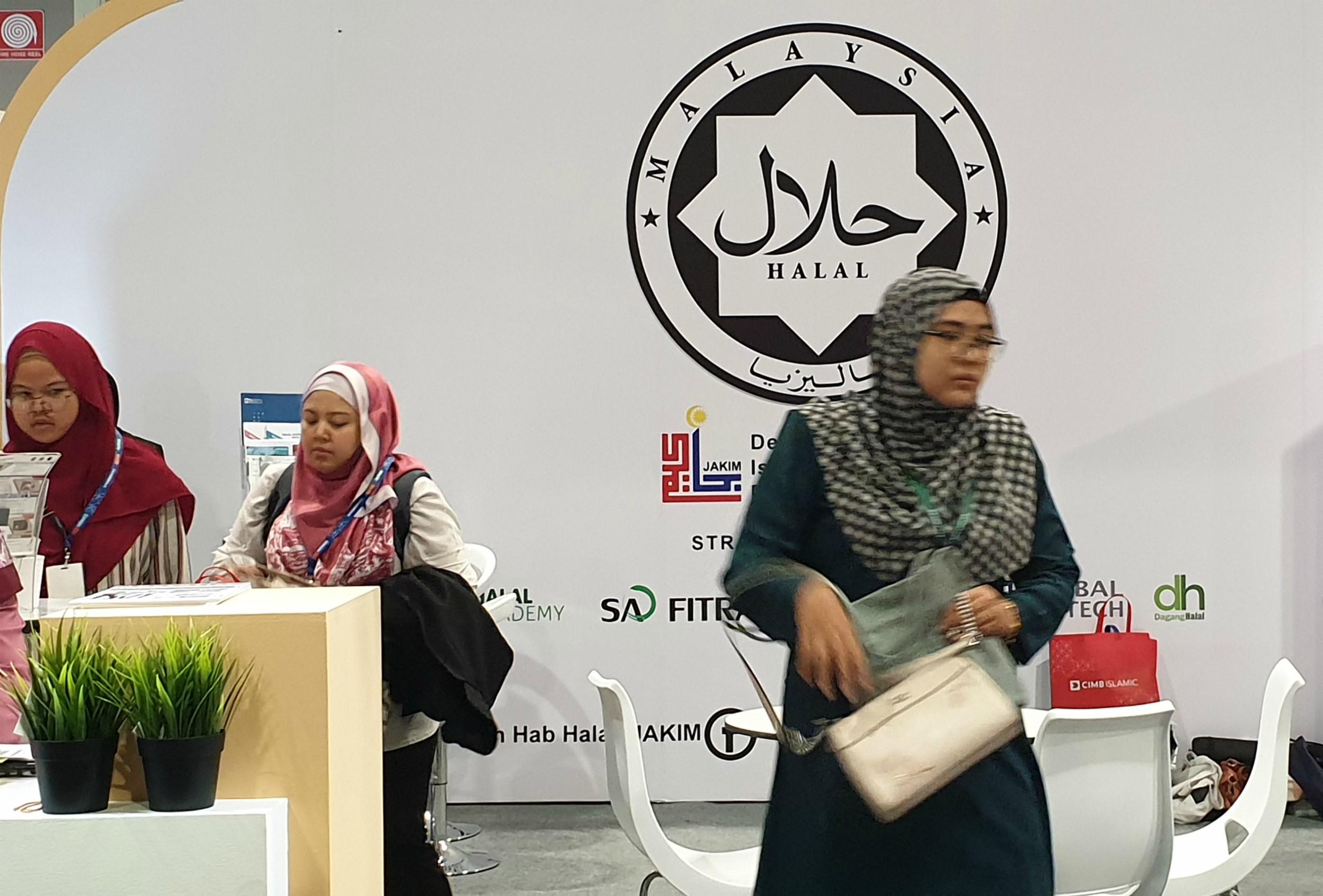No definitive guideline or criteria for halal certification of non-food items for now – JAKIM official
Photo: Visitors are seen at the JAKIM (Department of Islamic Development Malaysia) booth at the Malaysia International Halal Showcase (MIHAS) on April 5, 2019 in Kuala Lumpur, Malaysia. SALAAM GATEWAY/Emmy Abdul Alim
KUALA LUMPUR - There are no established guidelines that govern whether a non-food item should be certified as halal, according to one JAKIM (Department of Islamic Development Malaysia) official.
Instead, any first-time request from a customer should be brought by a certification body to a JAKIM panel for evaluation before it is approved, Muhammad Fahdi bin Mohamed Sobri told Salaam Gateway.
“For now there is no definitive guideline or criteria for the certification of non-food items,” said the outgoing assistant director of the strategic department at JAKIM, who has just moved to another role in the government agency.
There has been increased interest in non-food-related consumer products seeking halal certification, “but not all products will get the green light for it.”
Muhammad Fahdi was speaking after a manufacturer of diapers and sanitary napkins became the first to be given JAKIM halal certification, sparking a flurry of debate in the halal community.
Salaam Gateway followed up with an article highlighting the disparity between different certification bodies in their approach to granting atypical, or non-traditional requests for certification.
Judging by how some claimed to have refused requests to put the halal logo on car tyres, copper valves and tiles—while others found a case to certify honey which many would say should be intrinsically halal—and reusable gloves, it appears there is some confusion over which path to follow.
Regulations laid down by JAKIM and all state certification bodies in Malaysia appear to take a conservative approach to granting the halal stamp, according to Muhammad Fahdi.
“The main criterion to comply for certification would be the purpose of a product,” he said. “This relates to whether it comes in direct contact with the consumer, such as food, cosmetics or pharmaceuticals.”
If an item is certified by a certification body recognised by JAKIM, the authority will acknowledge this “with a certain discretion”, unless it is “beyond acceptable grounds”.
“JAKIM does apply certain guidelines for certification bodies to comply with,” the official added.
The certification authority cannot, however, roll back certification that has already been granted by a certification body even if it does not agree with it opening up a new halal segment. This, Muhammad Fahdi reasoned, is because the certifier would have assessed the product meets all halal criteria during its audit and “would have justified its use” of the halal logo.
“We can only provide assistance in terms of advice or opinions on the matter,” Muhammad Fahdi said.
“Unfortunately at the moment, there is no clear way of upholding a certain benchmark for the integrity of halal certification across borders to prevent unnecessary use or manipulation.”
He suggests the halal economy has been changing in such a way that the consumers, and not just Muslims, are now viewing the halal logo differently.
"Halal has somehow shifted its standing point and is now not just a religious requirement for Muslims, it has grown to become a safety benchmark for a wider group in society that understands the basic values of hygiene, health and quality that halal upholds in its implementation,” he said.
However, despite a perceived supposed growth in demand for the apparently “tayyiban” virtues of a product, which go beyond the fundamentals of halal, Muhammad Fahdi does not believe the two are being regulated into becoming interchangeable.
This is a point argued by some certifiers in the wake of the debates over the halal-ness of diapers and sanitary napkins. They say that manufacturers are invoking the halal logo to signify their tayyiban-ness of items that are inherently halal.
“Not really, I don't see how it is applicable as such,” said Muhammad Fahdi. “Tayyiban means good and is a term used to elevate halal to a stronger wholesome value.
“But not all good things will require halal. To benchmark a product based on its merits wouldn't be sufficient for certification.”
WHY HALAL-CERTIFIED DIAPERS?
Elaborating on why JAKIM saw it fit to halal certify diapers and sanitary napkins, JAKIM senior assistant director for policy and standards Muhammad Hawari bin Hassan told Salaam Gateway that these consumer items are eligible because they have “direct contact with the human body”, as defined by JAKIM.
“The Malaysian halal certification committee will evaluate new applications based on the element of direct contact with a person,” said Muhammad Hawari.
The committee will evaluate the application by considering demand for the product and its potential for containing any non-halal elements.
This was the case for Malaysian company Chemway that received halal certification for its car wash products last year after two tries in 2016. Chemway argued successfully to JAKIM that its products should be halal-certified as they come into contact with human skin.
“It is only when a sufficient number of genuine enquiries has been made to various parties that the item will be considered suitable for certification,” said Muhammad Hawari.
The committee consists of members qualified in Shariah, and who have technical and regulatory halal experience.
The committee also seeks advice and views from the National Fatwa Council for cases that require in-depth clarification for it to be considered suitable for certification, Muhammad Hawari added.
(Reporting by Richard Whitehead; Editing by Emmy Abdul Alim emmy.alim@refinitiv.com)
© SalaamGateway.com 2019 All Rights Reserved
